

Admit it; you’ve faked sickness, too, before. Your mom was pushing you out of bed when it was rainy and cold outside. All you wanted to do was to sink into your bed further, but she was pulling your arms so that you could have your breakfast and go to school. Ugh, school, right? We all hated school when we were kids. If not for playtime, we would have never set foot in that school ever again. And schoolwork? We hated that even more.
So what a kid gets to do when all they want is to sleep all-day (and maybe play later in the afternoon)? Why, avoid school altogether by faking a sickness, of course. So you have told your parents—at least once—that your tummy aches or that you have a headache. Your mom lets go and calls your teacher, believing that little white lie all because you couldn’t push yourself out of bed. Now that you’re a parent, you have to ask yourself: “Is my kid faking sickness, too, like I did?”
Sniffles
It’s hard to fake colds because there’s a physical manifestation of having a cold. Still, some kids will opt for that route since all they have to do is sneeze occasionally and try to sniffle. How do you know that your kids truly have colds? Well, if it happens too often, and they have respiratory problems, then that cold may be a symptom of something else. If it is happening regularly, find out what is triggering their colds. Most homes have old heating and cooling systems. It might be time to replace your air conditioner if it’s too old, dirty, and malfunctioning. Who knows what dirt and molds it carries and spreads around?
A red nose and watery eyes are signs of a cold. If your kids look in the pink of health, then you are being duped. Don’t get fooled by sniffles. Ask them to blow their noses on a napkin and see if something comes out.
Headache
It is easy to fake a headache because no one can see what’s causing it. There is no device to tell if you’re having a headache or even how painful it is. Don’t worry, though. It is easy to tell when your kids are faking it or suffering from a headache. If they are closing their eyes and unwilling to play, then they might be suffering from migraine. It could be something about their eyesight, too. If your kids are already having difficulty eating, walking, or talking because of the headache, it’s time to bring them to the emergency room.
For most kids, headaches are mild that can go away in a few minutes. If they can still watch television and laugh, then they are fine enough to go to school. Tell them you’re going to take them to the doctor, so you can see them heal miraculously. They’ll be okay going to school then.
Tummy Ache
Once in a while, it is normal for kids to have a stomachache because they ate too many sweets or they’ve played immediately after eating. But stomachache that comes with fever, vomiting, nausea, and diarrhea should never be taken lightly. You have to immediately take them to the doctor or the emergency room lest they get dehydrated. It’s easy to see if your kids are faking a tummy ache since kids with the stomach bug will have cold, clammy skin and constricted pupils. Plus, they won’t have an appetite even for their favorite food. If your kids are still eating breakfast and playing, then they’re fine enough to go to school or do their homework.
Fever
Kids know that a thermometer can measure their actual temperature, so they sometimes eat or drink hot food to spike up their temperature. The good thing is that since you’re an adult, you should be smarter than your kids. If you think they just ate hot food, wait for a few minutes before taking their temperature. If they also just played and looked winded, have them rest for 20 minutes before putting the thermometer on their skin or in their mouth.
These days, having a fever is alarming because of the coronavirus. Your kids may not even take this route since they know what’s been going on. If your kids have a fever (even a low-grade one), don’t push them to go to school since feverish kids can’t focus on learning anyway. They should take a rest.
It’s easy to spot if your kids are faking illness. Remember that as an adult, you are smarter and way more creative than them. If they can eat, play, and watch TV, they’re good enough for school. But if you notice them not doing their usual activities, then let them rest for now.

